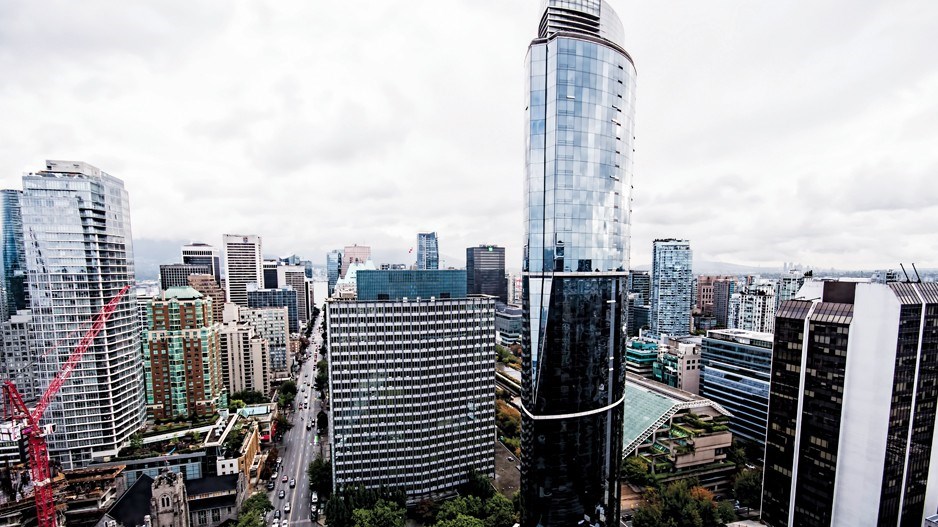Sixteen new storefronts, ranging from candy shops to restaurants, have opened up in downtown Vancouver over the past two months, according to Nolan Marshall III.
“Our openings are outpacing our closings at this point in the pandemic recovery,” says the CEO of the Downtown Vancouver Business Improvement Association (DVBIA).
“I know downtowns across North America that haven't had any new retailers open. They're still dealing with the negatives.”
Marshall has been travelling to other U.S. cities over the past year as well as speaking to his counterparts across North America.
He said there couldn’t be a stronger contrast to his family’s weekend walks through their downtown neighbourhood, where they see family after family stroll by, versus the time not too long ago he cast his gaze upon downtown Houston to find a stunning lack of vibrancy.
But downtown Vancouver is experiencing just 43 per cent of the visits it had prior to the pandemic, according to a report released late last month by the University of California, Berkley’s Institute of Governmental Studies (ISG).
That level of activity is low enough to rank it No. 57 out of the 62 North American downtowns examined. Houston, for its part, ranked No. 31, with activity at 57 per cent of pre-pandemic levels.
Researchers used cellphone pings from 18 million smartphones across the continent between March 2020 and May 2022 to measure how much activity was returning to urban centres.
The ISG's "The Death of Downtown?" study found Columbus, Ohio, leading all North American cities with downtown activity there standing at 112 per cent of what it was pre-COVID-19.
The DVBIA has also used cellphone data to measure downtown activity and Marshall said this type of data can have significant limitations when comparing American and Canadian cities, owing to the latter’s stricter privacy laws.
“My experience talking to colleagues, my experience visiting other places, just runs completely counter to where I think that report ultimately had Vancouver ranked,” he said.
Marshall said problems also arise depending on how one defines a visitor when using cellphone data to judge how active an area is.
Vancouver’s downtown peninsula is one of the most densely populated areas in Canada and the U.S.
“If you draw your data collection map across the entire downtown, you're not identifying people who live within the area as a visitor,” Marshall said, “which is why we only do our cellphone data collection around our retail districts, and specifically so we can track how many people are going into those retail districts since they don't have as many residents as the rest of downtown.”
The relatively low activity the ISG report attributes to downtown Vancouver places it in the same class as Chicago (43 per cent), Detroit (42 per cent), Portland (41 per cent) and San Francisco (31 per cent).
But it's also comparable to levels seen in other Canadian cities, such as Calgary (46 per cent), Toronto (46 per cent) and Montreal (44 per cent).
“A distinct set of downtowns – typically older, denser downtowns reliant on professional or tech workers and located within large metros – continue to struggle to return to pre-pandemic levels,” the ISG report stated, noting most cities that ranked high were based in the Southern U.S.
“Although many employers are beginning to enforce in-person work requirements, tight [labour] markets for high-skilled workers mean the employers have little leverage.”
The report concluded it may be time to “reinvent downtown” and that those looking to diversify their economies should focus on “resilient sectors” like education, health and government.
It also suggested older office buildings be converted for residential, institutional and recreational uses.
Despite the lack of workers returning to downtown Vancouver, office towers in the city’s core aren’t hurting for tenants.
The city’s downtown office vacancy rate reached 7.4 per cent in the second quarter of this year, according to a June report from Colliers International Canada.
Among Canadian cities, only Victoria had a lower downtown office vacancy rate (6.1 per cent).
Despite the July ISG study pointing to the tech sector’s accommodations for remote working as one of the reasons behind a lack of downtown activity, a Colliers representative told BIV at the time of its own June report that tech companies were driving demand in the city’s office market.
CBRE Group Inc.’s 2022 Scoring Tech Talent report last month ranked Vancouver as the No. 8 tech hub in North America, owing in part to an exchange rate that made it cheaper to hire workers and lease space.
Average wages for tech jobs in Vancouver stand at US$91,686 compared with US$122,341 in Seattle and US$139,907 in San Francisco
Meanwhile, Metro Vancouver saw the highest surge of tech employment (+66 per cent) across all North American tech hubs between 2016 and 2021, adding a total of 44,600 jobs as more multinationals set up shop and as homegrown companies expanded.
Though the rise of remote working might lead one to believe downtown office space would be in less demand, big U.S. tech companies appear to be growing more comfortable tapping workers based in Vancouver offices to exploit lower operating costs.
PlentyOfFish (now owned by Match Group), fintech Tipalti Inc., medical devices firm Masimo Corp. (Nasdaq:MASI) and Microsoft Corp. (Nasdaq:MSFT) are among the American tech companies that have been expanding significantly in downtown Vancouver over the past year.
And homegrown tech firms that recently reached unicorn status (a valuation of US$1 billion or more) have also been increasing their footprint in the city’s downtown core, including Trulioo Information Services Inc., GeoComply Solutions Inc. and Galvanize.
Meanwhile, public safety remains the top concern among downtown stakeholders, according to Marshall.
“And it's a challenge that I think a lot of urban places and downtowns are dealing with right now,” he said.




